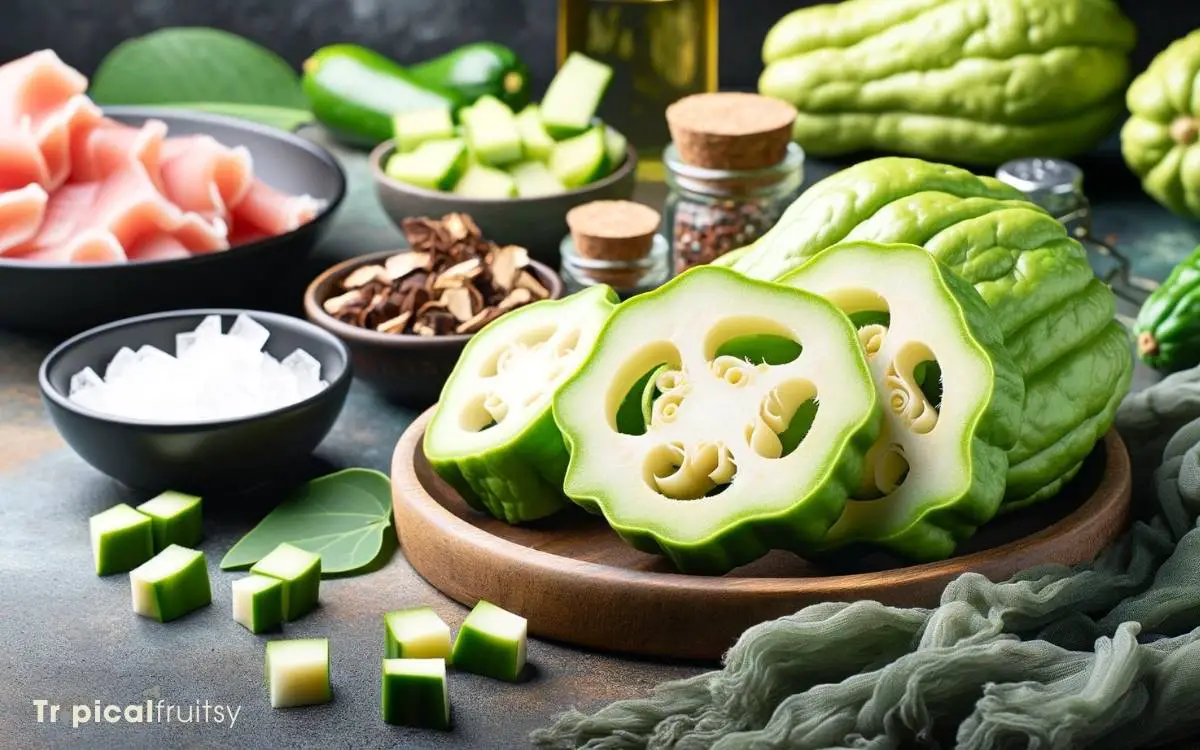Can You Eat Chayote on Keto? Yes!
Yes, you can eat chayote on a keto diet. Chayote, also known as mirliton squash, is a low-carb vegetable that fits well within the macronutrient requirements of a ketogenic diet.
The ketogenic diet is a high-fat, moderate-protein, and very low-carb diet that aims to put the body in a state of ketosis, where it burns fat for fuel instead of carbohydrates.
Vegetables, particularly non-starchy ones, are a key component of a healthy keto diet as they provide essential nutrients and fiber while keeping carb counts low.
Chayote is a versatile squash that contains only 2.2 grams of net carbohydrates per 100 grams, making it an excellent choice for those following a keto diet. It can be eaten raw or cooked and is commonly used in salads, soups, and stir-fries.
Here’s a comparison of chayote’s carb content with other keto-friendly vegetables:
Incorporating chayote into your keto diet adds variety and nutrition, ensuring you can enjoy delicious meals while staying within your carbohydrate limit.

Key Takeaway
Understanding the Keto Diet
The keto diet centers on our body’s adaptation to using fat for fuel instead of carbohydrates. Essentially, we’re flipping the metabolic switch from glucose to ketones, a type of fuel that our liver produces from fat.
This process, known as ketosis, can lead to weight loss, improved insulin sensitivity, and other health benefits.
When we restrict our carb intake drastically, our body has to find an alternative energy source, and fat becomes the primary fuel.
For this reason, we must choose foods with low net carbs to maintain ketosis. While we’re evaluating whether chayote is keto-friendly, we’ve to consider its carb content relative to the nutrient density and how it fits into our overall daily carb limit.
Nutritional Profile of Chayote
We’ve established that the keto diet requires careful consideration of the carbohydrate content in our foods.
Chayote’s nutritional profile is promising for keto enthusiasts, as it boasts a low carb count complemented by a substantial amount of dietary fiber.
Additionally, it provides essential vitamins and minerals, which are crucial for maintaining overall health while adhering to a restrictive diet.
Low Carb Content
In assessing the suitability of chayote for a ketogenic diet, we’ll examine its low carbohydrate profile, which is crucial for maintaining ketosis.
The nutritional content of chayote positions it as an ideal vegetable for those monitoring their carb intake.
Here’s a quick breakdown:
- Total Carbohydrates: A 100g serving of chayote contains about 4.5g of total carbohydrates.
- Dietary Fiber: Out of these carbs, 1.7g are dietary fiber, which nets only 2.8g of digestible carbs per 100g serving.
- Sugars: Chayote is low in sugars, with only 1.7g per 100g.
Given these figures, it’s clear that chayote’s carb content is minimal, making it a keto-friendly option. We can include it in our meals without significantly impacting our daily carb limits.
Fiber Quantity
Considering the nutritional profile of chayote, we’ll now focus on its fiber content, which is an essential component for digestive health on a ketogenic diet.
Fiber is crucial for maintaining bowel regularity and can aid in managing blood sugar levels, both of which are important considerations when you’re following a keto regimen.
Chayote is a fiber-rich vegetable; a single cup contains about 3.5 grams of dietary fiber. This amount represents a significant portion of the daily fiber requirement, especially considering the restrictive nature of a ketogenic diet.
It’s also worth noting that fiber isn’t counted toward net carbs since it doesn’t significantly impact blood sugar levels.
Thus, chayote’s fiber contributes to fullness without compromising the carb limit on a keto diet.
Vitamins and Minerals
Let’s delve into the vitamins and minerals found in chayote, which further establish its suitability for a keto diet.
This vegetable isn’t just low in carbs; it’s also packed with essential nutrients that can complement your nutritional needs while you’re limiting your carb intake.
Here’s a quick rundown:
- Vitamin C: Chayote is a good source of Vitamin C, important for immune function and skin health.
- B Vitamins: It contains B-complex vitamins like folate, which are crucial for energy metabolism and maintaining a healthy nervous system.
- Minerals: You’ll find minerals such as potassium, magnesium, and manganese in chayote, all of which support heart health and metabolic processes.
Analyzing its nutritional profile, we can see that chayote provides more than just low-carb benefits; it’s a powerhouse of vitamins and minerals that are vital for our overall well-being.
Chayote Versus Other Vegetables
When we compare chayote to other vegetables, it’s critical to examine carb content, as this is a primary concern for keto dieters.
Our analysis reveals that chayote’s low carb count stands favorably against starchy options like potatoes and corn.
Additionally, we’ll evaluate how its nutrient density measures up to leafy greens and cruciferous veggies, which are keto diet staples.
Carb Content Comparison
We’ll compare the carb content of chayote to other popular vegetables to assess its suitability for a ketogenic diet.
To give you a clearer picture:
- Chayote: One cup of chayote contains about 6 grams of carbohydrates, which is quite low.
- Broccoli: A similar serving of broccoli offers approximately 6 grams of carbs, mirroring chayote’s low-carb profile.
- Potatoes: In contrast, a cup of potatoes has about 26 grams of carbs, making it much less keto-friendly.
These numbers reveal that chayote’s carb content is on par with other keto-approved vegetables like broccoli. It’s a clear indication that chayote can fit comfortably within the carb limits of a ketogenic diet.
Nutrient Density Contrast
We’re examining the nutrient profile of chayote in comparison to other vegetables to determine its value in a keto diet.
Chayote is a low-calorie vegetable rich in vitamin C, fiber, and essential minerals like manganese and zinc.
When we contrast it with leafy greens, chayote has fewer vitamins per calorie but offers more water content, which can be hydrating.
Compared to starchy vegetables like potatoes, chayote is significantly lower in carbs, making it more suitable for keto.
It doesn’t quite match the nutrient density of cruciferous veggies like broccoli or Brussels sprouts, but it’s versatile and lighter, which can be beneficial for maintaining a diverse, low-carb diet.
Benefits of Chayote on Keto
Our inclusion of chayote in our keto diet offers a multitude of nutritional advantages.
This versatile squash isn’t only low in carbs but also rich in fiber and essential nutrients, making it a keto-friendly choice.
Here are some key benefits:
- Low Net Carbs: Chayote contains a minimal amount of net carbs, ensuring we stay within our daily carb limit without compromising our state of ketosis.
- High in Fiber: The high fiber content aids in digestion and can help us feel full longer, which is beneficial for weight management on a keto diet.
- Rich in Micronutrients: It’s a good source of vitamins C and B, as well as minerals like potassium and magnesium, which support overall health.
Incorporating chayote into our meals can enhance our nutritional intake while maintaining ketosis.
Preparing Chayote for Keto
How can we best prepare chayote to complement our keto diet?
Chayote is a versatile vegetable that we can easily incorporate into our ketogenic lifestyle. To start, we should opt for cooking methods that don’t add unnecessary carbs.
This means favoring sautéing, roasting, or steaming over breading or frying. When we sauté, using healthy fats like olive or avocado oil is preferable to maintain ketosis.
We can enhance its flavor with keto-friendly herbs and spices, avoiding sugary sauces or dressings that can disrupt our carb count. Chayote can also be consumed raw, sliced thinly in salads for a crunchy texture.
By keeping preparations simple and carb-conscious, we ensure chayote enriches our keto journey without breaking our carbohydrate budget.
Creative Keto Recipes With Chayote
Let’s explore three inventive ways to incorporate chayote into our keto meal plans.
Chayote is a low-carb vegetable that’s versatile and can be a fantastic addition to our ketogenic diet.
- Chayote Squash Hash Browns: Grate chayote and mix with an egg, salt, and your choice of herbs. Fry in a skillet until crispy. This alternative to traditional hash browns is both nutritious and satisfying.
- Stuffed Chayote Boats: Halve the chayote and remove the seed to create a hollow. Fill with a mixture of ground meat, cheese, and spices, then bake until tender. It’s a high-protein dish that’s full of flavor.
- Chayote Keto Noodle Stir Fry: Slice chayote thinly to mimic noodles. Sauté with vegetables and your favorite protein, tossing in a keto-friendly sauce. This dish offers a delightful way to enjoy a noodle-like texture without the carbs.
Conclusion
We’ve discovered that chayote is a keto dieter’s best friend, a low-carb chameleon that blends seamlessly into our meal plans. Its crisp texture and mild flavor make it a versatile ingredient in our keto kitchen.
By incorporating chayote, we’re not just cutting carbs; we’re enriching our diet with nutritious versatility.
Let’s continue to peel back the layers of keto-friendly foods, finding fresh ways to sustain our journey on this healthful path.






